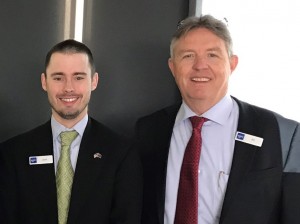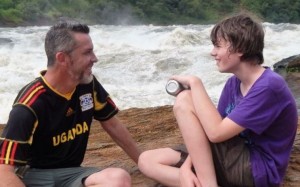Love them and let them go: confronting your parental instincts
Posted on
The ABC’s Australian Story recently featured the tale of a couple who decided to take an unorthodox approach to challenging their autistic son.
Just as 14-year-old Sam was entering adolescence, his family insisted he embark on a six-month backpacking trip around Africa with his father, Dr James Best.
This would not be overly noteworthy if not for the fact that Sam is autistic, where routine, order and predictability are considered essential for the person to thrive.
Throwing a young man into a chaotic, unfamiliar setting is widely considered the exact opposite of ‘what the doctor ordered’.
While the ambitious ‘immersion therapy’ style plan of Dr Best and his wife Benison O’Reilly was met with disbelief and judgement ahead of the trip, Dr Best and Sam returned from Africa with a host of positive outcomes.
Bucking the status quo makes waves
Bill Gamack, CEO of disability not-for-profit EPIC Assist, says while the Africa experiment isn’t possible or practical for everyone, it highlights the merits of embracing the path less travelled.
“There’s no denying it would have been far easier for James and Benison to keep Sam’s life controlled, closely managed and routine. Bucking the status quo is always going to make waves, on many levels,” said Bill, who also has an autistic family member.
“Taking action that is difficult, often thankless and at times seemingly impossible can prove worthwhile and life-changing in the long run.”
Bill says straying from conventional methods can be stressful for parents because they may feel they are fighting against their natural instincts.
“Parents of (autistic) children want to create an environment where the child feels safe and in control. They want to protect their children from the often unforgiving and unpredictable nature of the real world,” Bill says.
“That’s very understandable; it comes from a place of love. But to build essential life skills, confidence and resilience, young people need to be uncomfortable and exposed to uncertainty at times.
“The more comfortable they become with things going wrong, the more their strength and independence will grow.”
Zach moved from the US to Australia for work
Zach Zaborny, who works in the Recruit Assist team at EPIC Assist, is on the autism spectrum and is living proof of what can be achieved when someone ventures from their comfort zone.
Zach moved from America to Australia for his job and regularly meets with large organisations to provide education around hiring people with disability.
He has presented to audiences across America, Australia and Europe, and even written a book about his experiences.
In Zach’s family, the fact that he was on the spectrum was not treated as anything particularly significant.
“I can’t say my being on the spectrum was really talked about as being an issue; it was more ‘oh, Zach’s a little quirky and different’, but that was about it,” Zach says.
“My parents made sure I did activities along with the other kids. For example, they insisted I play baseball and said ‘try it for a season, and if you don’t like it, you don’t have to do it anymore’.”
“They expected the same from me as from my brother, and I understood that from a young age.
“I think we are seeing different ways of dealing with autism now. When I was growing up, it was like ‘how do we assist this person as a young child’ and ‘how do we best accommodate this person in the school setting’.
“But now it’s become more commonplace to think about what will happen to that person after school, as they enter adulthood.
“Everybody grows up, and parents want to make sure their children will be independent and set up to manage their own lives. I think that’s what Sam’s parents were thinking when they decided on the Africa trip, and that’s why they took this major chance.”
Zach says distancing people on the spectrum from a strict routine can have a positive impact on personal development, helping people better understand the world and their place in it.
‘I understand who am more’
“I used to be routine and ordered about everything, but now I’ve moved into a routine more about me, not so much about my surroundings. I understand who I am more,” Zach says.
“I have all the same concerns as other people my age. I’m thinking, ‘Where am I going in my life? What am I doing? What are my 20’s all about, and as they draw to a close, what will my 30’s be like?’”
“The more experiences I have, the less I’m stressing about things I would have before. I’m realising the more I’m out in the world, the less I can control. So I’m learning to let go.”
By Ellen McGruer, Epic Assist


